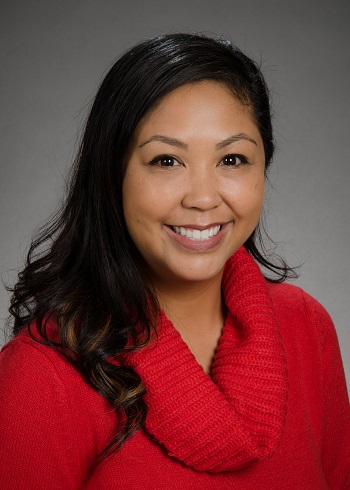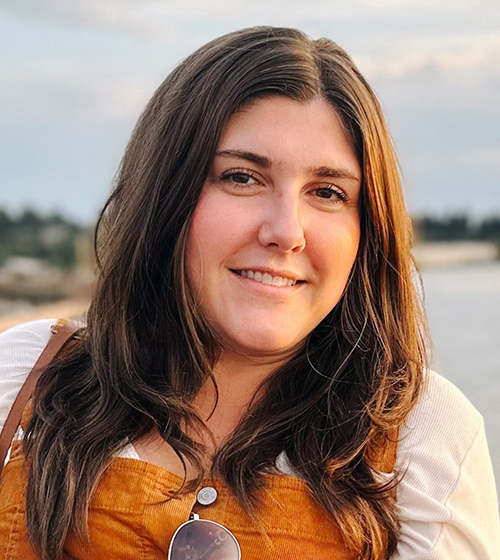
Bias Incident Reporting
Since the UW School of Medicine launched the Bias Reporting Tool in early 2021, over 1500 events have been reported. View the 2024 annual report.
Resources: If you have experienced a bias incident, you may submit a bias incident report to UW Medicine or contact the UW Civil Rights Compliance Office.
meet our navigators
Navigators can provide a safe space to express concerns, help to navigate through the resources and options available and provide conflict resolution coaching.

Leila Armas-Valencia
Program Operations Specialist
Sleep Medicine Fellowship Administrator
Leila supports her division faculty and fellows with everything from on-site onboarding to managing rotation schedules and educational conferences. As the sleep medicine fellowship administrator, she is the point of contact for the nationwide candidates who apply to the program each year, and once onboard, she helps guide fellows throughout their one-year program.
She particularly enjoys the diverse and passionate people that make up the UW.
Leila credits her role as a Bias Navigator as her way of helping learn more about one another and celebrate diversity.

Andréa Campbell, MSc (she/her)
Assistant to the Directors
Internal Medicine Residency Program
Andréa received her undergraduate degree in psychology, with a minor in Spanish from the University of Arizona and obtained her master of science in industrial organizational psychology, graduating from Northcentral University in 2022.
She has served in her role as assistant to the directors for over seven years, in which she manages the onboarding and recruitment of residents in addition to many special projects.
As the primary counterpart to the assistant program directors for diversity and inclusion, wellness, and professional development, Andréa plans several additional program events throughout the year and has collaborated on a number of scholarly projects and presentations relating to these topics.

Lori Joubert, MA (she/her)
Program Coordinator
Division of Cardiology
Lori received her master of arts degree in speech communication from the University of Washington in Seattle where she studied organizational and interpersonal communication focusing on listening skill development in complex organizations. Since then she has managed, led, and coordinated groups where she has integrated listening as an essential human activity in a variety of roles.
Lori is a relationship-oriented communicator with a passion for serving others, connecting people with the resources they need to be successful, and has worked at UW Medicine for fifteen years.
On the weekends, she enjoys connecting with her family and community, dance classes, and nature walks.
What do Navigators do?
Their roles can be broken down into three categories:
Listening
“What did I just experience? Why do I feel this way?”
Resource Navigators offer a compassionate and confidential space for department employees to share and process workplace experiences that may have impacted your sense of belonging, well-being, or inclusion. Experiencing something concerning in the workplace may be uncomfortable and may cause one to think: What did I just experience? Why do I feel this way? What are my options? Resource Navigators are here to listen to your experience and concerns while providing you with available resources.
Resource Guide
We are here to show you your next step if you feel comfortable enough to move a process forward. The Department of Medicine, School of Medicine, and University at large can be a complex institution. A Navigator will be able to inform you of the options available to you and point you in the best direction, whether you choose to follow an informal or formal process.
Conflict Resolution Coaching
We understand that some individuals would prefer addressing the incidents they may have experienced themselves. Navigators are trained to help coach and help utilize the skills, language, and strategies to have tough conversations on your own.
Contact a DOM
navigator
Report a bias incident to UW Medicine (Bias Reporting tool)
learn moreCONFIDENTIALITY
It is important to note that Navigators do not perform formal investigations. Our mission is to provide you with support and advocacy while determining follow-up activity where appropriate. Responses will vary based on the nature of the incident and can include additional communications with pertinent offices on campus. In most cases, the employee decides if they want to have a formal investigation initiated. However, there are certain instances (e.g., sexual misconduct, hate crimes) where we may be compelled by law to report.
ADDITIONAL RESOURCES
Well-Being & Safety
- CareLink
- Peer-to-Peer
- Know Your Rights
- LiveWell Confidential Advocates
- Queer Center
- Safe Campus
- Transgender Resources
- TheWholeU
Reporting Tools and Complaint Resolution
- Bias reporting tool
- Civil Rights Investigation Office
- Diana Chiang Cooke, ombud for the School of Medicine: email or schedule an appointment
- DOM Intranet-Complaint Resolution Resources
- DOM Academic HR: Jackie Monroe or Dr. Cynthia Ko
- DOM Staff HR: Bryn Vaswig or Chrissie Younie
Accessibility
Affinity Groups
- Asian and Pacific Islander American Faculty & Staff Association
- Black Faculty & Staff Association
- Q Faculty, Staff & Allies Association (QFS)
- Latinx Association
- Native Association




